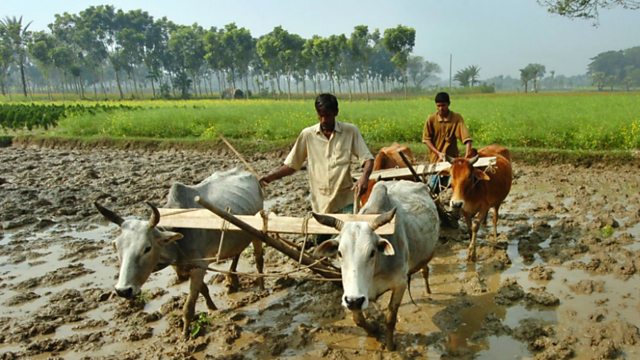Natural Cycles, Manmade Calendars
What climate change means for Bangladeshi farmers; in the DMZ separating North from South Korea; keeping the Ramadan fast in Iceland; the mystery of Wittgenstein's lost notebooks
Pascale Harter introduces tales of change - and loss - from around the world.
Bangladesh is extremely vulnerable to the effects of climate change. We often hear of floods, cyclones and land loss there as temperatures and sea levels rise; but on a journey through the country's farmland, Peter Oborne heard of a slower, yet still relentless, toll being taken on the old rhythms of life. Crops, fish stocks, mud-brick homes and human health are all suffering from the impact of creeping salt water.
Amy Guttman gets into the demilitarised zone (DMZ) which separates North and South Korea - to hear about what daily life is like at the dead centre of one of the world's most high-stakes diplomatic disputes. Whatever happens at the proposed summit in Singapore, this narrow strip of land is "like a continuous ribbon of ironies", she finds.
The dawn-to-dusk fast during Ramadan can be testing in any climate, but Athar Ahmad joins the Muslims who're observing the longest daily fast in the world this year - in Iceland, where daylight lasts for more than 20 hours a day in May.
And Kieran Cooke reveals the undignified fate of some of the final notes of Ludwig Wittgenstein. It turns out that one of the 20th century's most esteemed philosophers liked the solitude of western Ireland, and whiled away many hours there watching the seabirds, roaming the fields at night, and jotting down his ideas in a frenzy of contemplation. But where did the manuscripts end up?
Photo: A farmer plows to till the soil for planting his rice crop in Jessore, Bangladesh, 2006. (Shutterstock)
Last on
More episodes
Previous
Next
Broadcasts
- Sat 9 Jun 2018 02:06GMT大象传媒 World Service East and Southern Africa, Americas and the Caribbean & West and Central Africa only
- Sat 9 Jun 2018 21:06GMT大象传媒 World Service except Americas and the Caribbean, Europe and the Middle East & News Internet
- Sat 9 Jun 2018 23:06GMT大象传媒 World Service Americas and the Caribbean & Europe and the Middle East only
- Sun 10 Jun 2018 02:06GMT大象传媒 World Service except Americas and the Caribbean, East and Southern Africa, News Internet & West and Central Africa
- Sun 10 Jun 2018 08:06GMT大象传媒 World Service except News Internet

